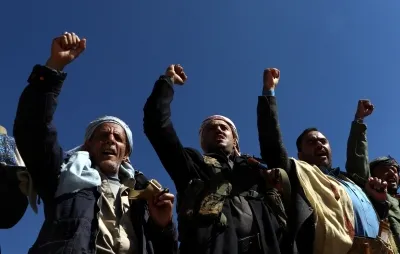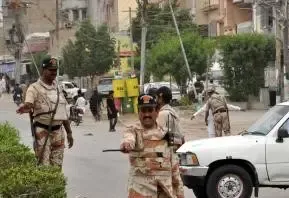Did Israel Successfully Intercept Another Missile from Yemen?

Synopsis
Key Takeaways
- Israel intercepted two missiles from Yemen in one day.
- The Houthi forces continue to target Israel, citing solidarity with Palestinians.
- Israel has conducted retaliatory airstrikes in Yemen.
- The ongoing conflict has resulted in significant casualties in Gaza.
- International airlines have reacted by suspending operations to Israel.
Jerusalem, May 23 (NationPress) Israel's military announced that a missile fired from Yemen was intercepted by the nation's aerial defense system, marking the second missile strike from Houthi forces on Israel within a single day.
The missile, launched around noon on Thursday, activated air raid sirens in the Jerusalem area, several settlements in the occupied West Bank, and the Dead Sea region, according to Israeli police.
Israel's Magen David Adom rescue service reported no injuries, as noted by Xinhua news agency.
"A missile fired from Yemen was successfully intercepted," the military stated, noting that sirens were activated "as per protocol."
Earlier, during the night between Wednesday and Thursday, another missile from Yemen was also intercepted.
While the Houthi forces in Yemen have vowed to halt attacks on US vessels, they continue to launch missiles at Israel, citing solidarity with Palestinians in Gaza.
The ongoing Israeli military operation, which commenced 19 months ago, has reportedly resulted in over 53,000 fatalities, according to health authorities in Gaza.
In retaliation, Israel has carried out a series of airstrikes in Yemen, including one in May targeting the capital, Sanaa, which damaged the main international airport and resulted in numerous casualties.
The Houthis took responsibility for both missile attacks, claiming they aimed for Ben Gurion Airport.
Additionally, the Iran-backed group asserted that they launched two drones at Israel overnight on Thursday. However, there were no indications that the drones successfully reached Israel from Yemen on Wednesday.
In response to the ongoing aggression from the Houthis, the Israeli Air Force struck the Houthi-controlled Hodeida and Salif ports in Yemen on Friday.
In retaliation, the Houthis pledged to respond.
Earlier this month, a Houthi missile breached air defenses and landed on the grounds of Ben Gurion Airport, injuring six individuals, though none seriously.
A number of international airlines quickly suspended services to Israel, although some have since indicated plans to resume operations.
Israel retaliated for that attack by striking Sanaa airport, causing approximately $500 million in damages.
The Houthis, whose slogan includes "Death to America, Death to Israel, and a Curse on the Jews," initiated attacks on Israel and general maritime traffic in November 2023, a month following the October 7 Hamas massacre.
They paused their fire during a ceasefire reached between Israel and Hamas in January 2025. By that time, they had launched over 40 ballistic missiles and numerous attack drones and cruise missiles at Israel, including one that resulted in civilian casualties in Tel Aviv in July, leading to Israel's first strikes in Yemen.
Since March 18, when the IDF resumed its offensive against Hamas in the Gaza Strip, the Houthis in Yemen have launched 37 ballistic missiles and at least 10 drones at Israel, with several missiles failing to reach their target.









